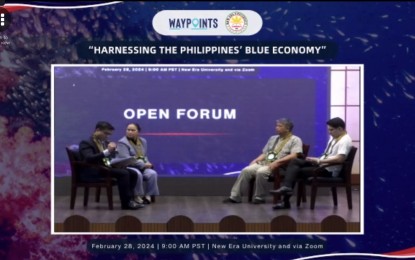
BLUE ECONOMY. Marine biodiversity, maritime affairs, and economic experts discuss updates and plans on the Philippines' blue economy, during the Waypoint's hybrid forum in Quezon City on Wednesday (Feb. 28, 2024). Experts underscored the need to protect marine resources and harness its economic potential. (Screengrab)
MANILA – Marine biodiversity and economic experts on Wednesday stressed the importance of protecting and harnessing the country's rich marine resources to boost the "blue economy."
During Waypoint’s hybrid forum in Quezon City, University of the Philippines (UP) Marine Science Institute Prof. Rhodora Azanza underscored the need to use research, development, and reinvestment for the country’s blue economy.
“We have to harness what we have in the ocean where we have most of our natural endowments,” she said.
The blue economy refers to the sustainable use of ocean resources for economic growth, according to the World Bank.
It is also defined as a practical ocean-based economic model used to achieve the country’s “twin goals” of enhancing potential contribution for sustainable development while ensuring the protection of oceans and coasts.
Included prospects for the blue economy are biodiversity tourism, fisheries and aquaculture, coastal manufacturing, ports and shipping, energy, seabed mining oil and gas, marine biotechnology and medicine, and marine technology and environmental services, among others
Azanza stressed the urgency to protect this “natural capital,” which she said contributes substantially to the country’s economy.
“If the biodiversity is deluded, destroyed in so many years, this will be a problem. I think most of our tourists are blue tourists,” she said.
“We need to reinvest (a) portion of the benefits from the blue economy to ensure sustainability and resiliency of the ecosystem. Like the right to fish, would have the obligation in that right to fish,” she added.
She said securing partnerships across the region is also deemed essential, as well as the boosting of support to the Philippine Coast Guard and Philippine Navy in terms of ensuring monitoring and national security.
Framework, legislation
National Economic and Development Authority (NEDA) Chief Economic Development Specialist Ralph Camelo Mariano, meanwhile, said the government, under the Philippine Development Plan 2023-2028, has priority measures in place.
“So we think that having a framework to put their actions and efforts all together will bring in this needed development for the blue economy, coupled up of course, with the added emphasis on putting investments and support to its development,” he said.
Mariano, however, stressed the essence of supporting the passage of priority legislative measures that seeks to “harmonize the efforts” of government agencies for the blue economy.
“What we see to be meritable in these bills is, in a way, providing a comprehensive framework to pursue the development of the blue economy. And we note that there are various government institutions with different mandates that are doing these," he said.
Among the salient features of the over 10 bills filed in Congress are the reconstitution of the National Coast Guard, the formulation of a policy framework for blue economy, blue finance, and blue economic zones, among others.
In January, the NEDA said the value of the country’s maritime resources was estimated to reach more than PHP1 trillion.
Ocean-based industries earlier recorded an 8.94 percent share to the country's gross domestic product in 2022, equivalent to PHP1.78 trillion. (PNA)
